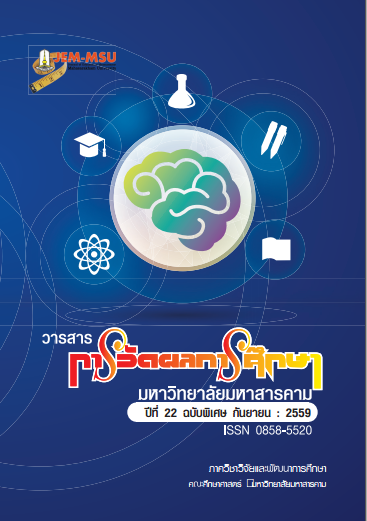Comparison of Learning Achievement in Physics on The Topic of Light and Optical Instruments and Scientific Process Skills in Matthayomsaksa 5 Students between Using 7-E Learning Cycle and Problem-Based Learning.
Main Article Content
Abstract
various teaching and learning activities. 7-E learning cycle emphasizes prior knowledge
transfer and building the knowledge through various learning process. Problem-based
learning Learners build their knowledge base on their prior experience. The purposes of this
research were : (1) to study lesson plans for organization of learning activities using 7-E
learning cycle and problem–based learning with a required efficiency criterion of 75/75, (2)
to study effectiveness s indices of the plans for organization of learning activities using 7-E
learning cycle and of the plans problem–based learning, (3) to compare science process
skills between using 7-E Learning cycle and Problem–based Learning (4) to compare learning
achievement, scientific process skills, between using organization of 7-E learning cycle
activities and using problem-based learning activities. (5) to study retention between
using 7-E cycle activities and Problem–based Learning activities. The sample for this
study consisted of 88 Matthayomsuksa 5 students from 2 classrooms in the second semester
of the academic year 2012 group under the Secondary Education Service Area Office 29.
obtained using the cluster random sampling technique. It was assigned from Dongsawangwittaya
school 5/1 using learning 7-E cycle activities and Nachaluay school 5/2 using problem-based
learning activities. The instruments used in this study were : (1) 10 lesson plans for organization
of learning activities using 7-E Learning cycle and lesson plans for organization of learning
activities using problem–based learning for 2 hours of each instruction, (2) a 40 item 5 multiple
choice achievement test with discriminating powers ranging .20-.91 and a reliability of
.94, (3) a 40 item 5 multiple choice the science process skills test with difficulties
ranging .24-.79, discriminating powers ranging .24 -.97 and a reliability of .84. The statistics
used for analyzing the collected data were percentage, mean, standard deviation, t-test
for (Dependent Samples) and One-Way MANOVA was employed for testing hypotheses.
The results of the study were as follows :
1. The plans for organization of learning activities using the plans for organization
of 7-E learning cycle and problem–based learning had efficiencies of 79.05/78.15 and
78.62/77.32 which were as the established requirement.
2. The effectiveness indices of the plans for organization of learning activities
using 7-E learning cycle and of the plans problem-based learning were .672 and .663 showing
that the students had learning progress at 67.20 percent and 66.30 percent respectively.
3. The students who learned using 7-E learning cycle activities and using
problem-based learning activities had higher learning achievement and scientific process
skills after learning than before learning at the .05 level of significance.
4. The students who learned using organization of 7-E learning cycle activities
did not have different learning achievement and science process skills learning those who
learned using organization of problem-based learning activities.
5. The students who learned using organization of 7-E learning cycle and problem–
based learning had been in learning retention.
In conclusion, the plans for organization of learning activities using 7-E learning cycle
and problem–based learning were appropriately efficient and effective. The students had
higher achievement test, science process skills than before learning and learning retention.
Therefore, teachers should be promoted to implement the organization of learning activities
using 7-E learning cycle and problem–based learning for students to achieve the course
objectives in the future .
Article Details
The content and information contained in the published article in the Journal of Educational Measurement Mahasarakham University represent the opinions and responsibilities of the authors directly. The editorial board of the journal is not necessarily in agreement with or responsible for any of the content.
The articles, data, content, images, etc. that have been published in the Journal of Educational Measurement Mahasarakham University are copyrighted by the journal. If any individual or organization wishes to reproduce or perform any actions involving the entirety or any part of the content, they must obtain written permission from the Journal of Educational Measurement Mahasarakham University.


